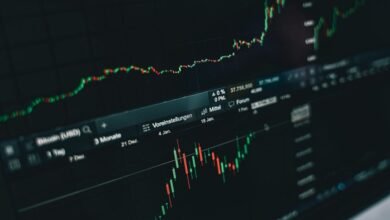50 Best Stocks to Buy in a Bear Market

In volatile markets, identifying resilient stocks becomes essential for maintaining portfolio stability. Companies with diversified revenue streams, strong cash positions, and sector-specific demand often outperform during downturns. While technology giants and defensive sectors offer different kinds of resilience, understanding their strategic advantages is crucial. This selection of stocks highlights those with the potential to withstand prolonged downturns, prompting further analysis of their operational strengths and market positions.
Apple Inc. (AAPL)
Apple Inc. (AAPL) remains a resilient contender in a bear market, underpinned by its diversified product ecosystem, robust cash reserves, and consistent innovation pipeline.
Its strategic focus on Apple innovation sustains competitive advantage, positively influencing stock valuation. This approach fosters investor confidence, promoting long-term growth prospects amid volatility.
Additionally, Apple’s emphasis on disciplined, forward-looking decision-making supports the pursuit of financial independence.
Microsoft Corporation (MSFT)
Microsoft’s leadership in cloud computing through Azure continues to drive revenue growth and market share expansion amid economic fluctuations.
Its robust financial position, characterized by substantial cash reserves and consistent profit margins, provides strategic flexibility during market downturns.
Additionally, an active innovation pipeline underscores the company’s potential to sustain competitive advantage and explore emerging technological frontiers.
Cloud Computing Dominance
Cloud computing remains a pivotal driver of technological innovation and revenue growth within the broader software and enterprise services sector. Microsoft’s cloud infrastructure underpins its SaaS leadership, enabling scalable solutions that empower users seeking operational freedom.
This strategic dominance positions MSFT to sustain competitive advantage, adapt to evolving market demands, and capitalize on future cloud-driven opportunities amid a volatile economic landscape.
Strong Financial Position
Microsoft maintains a robust financial foundation characterized by substantial cash reserves, consistent revenue growth, and strong profitability metrics. This financial stability provides resilience amid market volatility, enabling strategic flexibility and sustained investment.
Its ample cash reserves serve as a safety net, reinforcing long-term stability and empowering shareholders seeking freedom through a resilient, well-capitalized enterprise capable of weathering economic downturns.
Innovation Pipeline
An extensive innovation pipeline underpins Microsoft’s strategic growth, emphasizing continuous development across artificial intelligence, cloud computing, and enterprise software.
Focused on disruptive technologies, the innovation pipeline positions Microsoft to lead market transformations and expand its ecosystem.
This strategic emphasis on pioneering solutions supports long-term value creation and aligns with a vision of technological freedom and market dominance.
Alphabet Inc. (GOOGL)
Alphabet Inc. (GOOGL) stands out as a resilient technology giant with a diversified portfolio spanning core search engine services, advertising, cloud computing, and artificial intelligence.
Its strategic valuation approaches mitigate market volatility, offering investors opportunities for long-term growth and freedom.
Careful valuation strategies highlight its stability amid turbulence, making it a compelling choice for those seeking resilient stocks in challenging markets.
Amazon.com, Inc. (AMZN)
Amazon maintains its leadership in e-commerce, driven by global market expansion and customer loyalty initiatives.
Its AWS segment continues to be a primary growth engine, contributing significantly to overall revenue and profit margins.
Strategic investments in logistics and new market entry further position Amazon for sustained long-term growth amid market fluctuations.
E-commerce Dominance Continues
E-commerce continues to solidify its position as a dominant force within the retail landscape, with Amazon.com, Inc. (AMZN) maintaining its leadership through strategic investments in logistics, technology, and customer experience.
Its focus on digital retail and mobile commerce enhances accessibility and convenience, empowering consumers seeking freedom from traditional retail constraints while reinforcing Amazon’s competitive edge in a rapidly evolving marketplace.
Cloud Computing Growth
The cloud computing segment has emerged as a critical growth driver for Amazon.com, Inc., contributing significantly to its overall revenue and strategic positioning. Its focus on expanding cloud infrastructure supports robust SaaS growth, enabling flexibility and innovation.
This strategic emphasis on scalable cloud solutions enhances Amazon’s competitive edge, offering customers greater freedom to customize and optimize their digital operations.
Strategic Expansion Plans
Strategic expansion plans by Amazon.com, Inc. (AMZN) focus on diversifying revenue streams and strengthening market dominance through targeted investments in new markets and technological infrastructure.
These initiatives leverage precise market entry strategies to enhance competitive positioning, enabling the company to maintain agility and resilience.
Such strategic foresight ensures Amazon’s ability to adapt and thrive amid evolving economic conditions.
Berkshire Hathaway Inc. (BRK.B)
Berkshire Hathaway Inc. (BRK.B) stands out as a resilient conglomerate with a diversified portfolio spanning insurance, utilities, manufacturing, and consumer goods, making it a noteworthy contender in a bear market environment. Its strategic resilience mitigates market volatility, while consistent dividend growth enhances income stability, appealing to investors seeking long-term freedom through dependable cash flow and capital preservation.
Johnson & Johnson (JNJ)
Johnson & Johnson (JNJ) exemplifies a resilient healthcare conglomerate with a diversified portfolio encompassing pharmaceuticals, medical devices, and consumer health products.
Its consistent dividend growth reflects strategic stability, while ongoing healthcare innovation sustains competitive advantage.
This resilience offers investors a strategic opportunity for steady income and long-term value in turbulent markets, aligning with those seeking financial independence.
Visa Inc. (V)
Why might Visa Inc. (V) be considered a resilient asset during a bear market? Its strong market sentiment reflects consistent transaction volume, supported by robust valuation metrics indicating undervaluation relative to growth prospects.
This strategic positioning offers investors a safeguard, aligning with the pursuit of financial independence while capitalizing on digital payment trends despite broader economic uncertainties.
Mastercard Incorporated (MA)
Mastercard’s strategic focus on expanding its e-commerce segment positions it well to capitalize on ongoing digital transaction trends.
Its diversified portfolio of payment solutions enhances resilience against market fluctuations and broadens revenue streams.
Evaluating its growth potential within these areas offers insight into its strength as a defensive investment during economic downturns.
E-commerce Growth Potential
Despite prevailing economic uncertainties, the e-commerce sector continues to present substantial growth opportunities for companies like Mastercard Incorporated (MA).
Emphasizing sustainable e-commerce practices and logistics innovation, Mastercard strategically positions itself to capitalize on expanding online markets.
This focus enhances payment security and streamlines cross-border transactions, empowering consumers seeking freedom through seamless, responsible digital commerce experiences.
Diversified Payment Solutions
Mastercard Incorporated (MA) has strategically expanded its portfolio of payment solutions to address the evolving needs of global consumers and businesses, emphasizing diversification beyond traditional card transactions.
Its focus on digital wallets and peer-to-peer payments enhances user autonomy and facilitates seamless, secure transactions. This strategic diversification positions Mastercard to capitalize on technological shifts and consumer demand for flexible, frictionless payment options.
Procter & Gamble Co. (PG)
Procter & Gamble Co. (PG) stands out as a resilient contender in the consumer staples sector, characterized by its diversified product portfolio and consistent dividend history.
As a dividend aristocrat, PG offers stability and reliable income, appealing to investors seeking security and growth. Its strategic positioning in essential goods supports ongoing demand, even amid economic downturns.
The Coca-Cola Company (KO)
The Coca-Cola Company demonstrates a strong track record of dividend stability, consistently providing reliable income streams amid market fluctuations.
Its extensive global market presence ensures diversified revenue sources and resilience during economic downturns.
These factors position KO as a strategic consideration for investors seeking stability in a bear market.
Dividend Stability
Coca-Cola Company (KO) exemplifies a resilient dividend policy characterized by consistent payments and minimal variance, even amid economic downturns. Its strong dividend sustainability is supported by steady cash flows and strategic financial management, ensuring payout consistency.
This stability reinforces investor confidence, aligning with those seeking financial freedom through reliable income streams during market volatility.
Global Market Presence
With operations spanning over 200 countries and territories, The Coca-Cola Company maintains one of the most extensive global footprints in the beverage industry.
Its strategic global expansion and market diversification reduce dependency on specific regions, enhancing resilience.
This broad presence offers investors freedom through diversified revenue streams, positioning Coca-Cola as a robust choice amid market volatility and economic fluctuations.
Pfizer Inc. (PFE)
Pfizer Inc. (PFE) remains a prominent pharmaceutical powerhouse with a diversified portfolio of vaccines, therapeutics, and consumer health products. Its broad range of offerings positions it as a resilient choice amid economic downturns.
Its strategic focus on Pfizer innovation and a robust vaccine pipeline underscores potential for sustained growth. This resilience appeals to investors seeking stability and the pursuit of long-term freedom through diversified healthcare assets.
UnitedHealth Group Incorporated (UNH)
UnitedHealth Group Incorporated (UNH) stands out as a leading diversified healthcare company, leveraging its extensive insurance and healthcare services to maintain stability during economic downturns.
Its focus on healthcare innovation enhances operational efficiency, fostering market resilience. This strategic positioning offers investors a resilient, growth-oriented option, aligning with those seeking financial freedom through stable, forward-looking healthcare investments.
Exxon Mobil Corporation (XOM)
Exxon Mobil Corporation (XOM) remains a dominant player in the global energy sector, characterized by its extensive upstream and downstream operations that provide a diversified revenue stream.
Strategic focus on energy transition initiatives supports future growth, while dividend sustainability enhances investor confidence amid market fluctuations.
This resilience underscores Exxon’s potential as a resilient, income-generating asset in turbulent times.
Chevron Corporation (CVX)
Chevron Corporation demonstrates notable resilience in oil prices, supported by strong market fundamentals and disciplined cost management.
Its stable dividend outlook reflects robust free cash flow generation and strategic capital allocation.
Additionally, Chevron’s targeted growth initiatives in renewable energy and technology position it for long-term value creation amid market fluctuations.
Oil Price Resilience
Oil prices have demonstrated notable resilience amidst broader economic uncertainties. This resilience underpins the strategic positioning of integrated energy firms like Chevron Corporation.
This stability supports oil market stability, enabling Chevron to capitalize on sustained demand and maintain price stability. Such dynamics reinforce the company’s resilience in a turbulent market, aligning with strategic goals for long-term growth and resource flexibility.
Dividend Stability Outlook
The company’s dividend stability outlook remains cautiously optimistic, supported by its strong cash flow generation and disciplined capital allocation strategies.
Stability trends indicate a consistent dividend payout, reflecting prudent financial management.
This strategic approach enhances shareholder confidence, ensuring dividend reliability even amid market volatility, and aligns with long-term value creation for investors seeking income stability and financial independence.
Strategic Growth Initiatives
Strategic growth initiatives at Chevron Corporation focus on leveraging technological innovation, expanding upstream and downstream capacities, and advancing its renewable energy portfolio to ensure resilient long-term performance.
These efforts facilitate targeted market entry and support brand repositioning strategies, enabling Chevron to adapt proactively within evolving energy markets, uphold competitive advantage, and sustain shareholder value amid economic fluctuations.
Walmart Inc. (WMT)
Walmart Inc. (WMT) remains a notable contender in the retail sector, demonstrating resilience through its extensive global supply chain and diversified product offerings.
As a leader in consumer staples, it offers stable retail investments, especially during downturns. Its strategic focus on cost efficiency and broad market reach positions WMT as a resilient, essential player in navigating economic uncertainties.
Nestlé S.A. (NSRGY)
Nestlé S.A. (NSRGY) exemplifies resilience within the consumer staples sector, leveraging its extensive global footprint and diversified portfolio to navigate downturns.
Its strategic focus on sustainable agriculture enhances long-term value, particularly in emerging markets where demand for nutritious, responsibly sourced products drives growth.
This approach fosters stability and supports the pursuit of consumer freedom through reliable, ethical offerings.
McDonald’s Corporation (MCD)
McDonald’s Corporation (MCD) demonstrates resilience in the fast-food industry through its extensive global presence and efficient operational model.
Its strategic focus on maintaining high brand loyalty fuels consistent revenue streams, even amid economic downturns.
This stability offers investors a chance to capitalize on a recognizable, scalable franchise that sustains growth and provides a reliable hedge within a volatile market environment.
PepsiCo, Inc. (PEP)
PepsiCo, Inc. (PEP) stands out as a resilient player in the consumer staples sector. It leverages its diversified portfolio of beverages and snacks to maintain stable cash flows even during economic downturns.
Its strong brand loyalty and strategic global presence position it as a reliable choice for investors seeking stability and growth amid market volatility.
Adobe Inc. (ADBE)
Adobe Inc. demonstrates notable market resilience amid economic downturns, supported by its diversified subscription-based revenue model. The company’s Creative Cloud segment continues to drive growth through expanding adoption across industries, maintaining a competitive advantage.
Strategic investments in AI and cloud services position Adobe for sustained performance even during bear markets.
Adobe’s Market Resilience
Among technology companies, Adobe Inc. (ADBE) has demonstrated notable resilience amid market downturns, driven by its robust subscription-based revenue model and diversified product portfolio.
Adobe’s strategic acquisitions and continuous Adobe’s creative cloud expansion have strengthened its market position, ensuring steady cash flow and adaptability.
This strategic agility fosters long-term growth potential, appealing to investors seeking freedom in resilient, innovative assets.
Creative Cloud Growth
How has the expansion of Creative Cloud contributed to Adobe’s sustained growth and market resilience? The shift to a cloud subscription model ensures steady revenue streams, while innovative creative tools foster user loyalty and attract new markets.
This strategic focus on flexible, accessible solutions enhances Adobe’s ability to adapt, empowering users seeking creative freedom in an evolving digital landscape.
Netflix, Inc. (NFLX)
Netflix, Inc. (NFLX) stands out as a strategic investment in a bear market due to its dominant position in the streaming industry and ongoing subscriber growth, despite macroeconomic challenges.
Netflix innovation continues to refine user experience and content diversity, maintaining resilience amid streaming competition.
This strategic agility offers investors a pathway to preserve and grow capital in uncertain times.
Salesforce, Inc. (CRM)
Salesforce, Inc. maintains a commanding market position through its extensive cloud-based solutions and integrated customer relationship management platform.
Its strategic acquisitions and product innovations suggest substantial growth opportunities in expanding digital transformation initiatives across industries.
Evaluating its competitive advantages and market penetration is essential to understanding its resilience during economic downturns.
Valuable Growth Opportunities
Despite prevailing economic uncertainties, Salesforce, Inc. (CRM) continues to demonstrate robust growth potential through strategic investments in cloud-based CRM solutions.
The company is also expanding its enterprise client bases. By targeting emerging markets and harnessing disruptive innovations, Salesforce positions itself for scalable expansion.
This approach offers a strategic avenue for investors seeking to capitalize on technological shifts and global digital transformation.
Strong Market Position
A strong market position is evidenced by Salesforce, Inc.’s extensive global footprint and its dominant presence within the Customer Relationship Management (CRM) industry.
Its market resilience and robust competitive advantages enable sustained growth even during downturns.
This strategic positioning provides a foundation for long-term value creation, empowering stakeholders to pursue financial independence with confidence amid market volatility.
Intel Corporation (INTC)
Is Intel Corporation (INTC) positioned to capitalize on emerging technological trends amid a challenging market environment?
Its focus on semiconductor innovation enhances long-term growth prospects, while strategic valuation metrics suggest potential undervaluation.
Cisco Systems, Inc. (CSCO)
Cisco Systems demonstrates significant growth potential within the networking sector, driven by ongoing digital transformation initiatives across industries. Its consistent dividend payments contribute to a stable income stream, appealing to investors seeking resilience during market downturns.
Analyzing these factors underscores Cisco’s strategic position as a defensive yet growth-oriented stock in a bearish environment.
Growth Potential in Networking
Networking technology remains a critical backbone for digital infrastructure, with Cisco Systems, Inc. (CSCO) positioned to capitalize on ongoing industry shifts. Its focus on expanding network infrastructure supports global digital transformation efforts, offering strategic growth opportunities.
Leveraging advanced solutions ensures resilience and scalability, aligning with the increasing demand for robust connectivity and innovation-driven networks in a rapidly evolving digital landscape.
Stable Dividend Payments
Building on its strategic emphasis on expanding network infrastructure, Cisco Systems, Inc. (CSCO) demonstrates a consistent commitment to delivering stable dividend payments.
The company’s focus on dividend consistency underscores its payout reliability, providing investors with a dependable income stream amidst market fluctuations. This strategic stability appeals to those seeking financial independence and resilient, long-term investment options.
The Walt Disney Company (DIS)
The Walt Disney Company (DIS) stands as a globally influential entertainment conglomerate, diversified across media networks, theme parks, studio entertainment, and consumer products.
Strategic investments in Disney streaming aim to bolster subscriber growth, while ongoing theme park recovery efforts seek to regain pre-pandemic momentum.
These initiatives position Disney for long-term resilience amid market fluctuations.
Home Depot, Inc. (HD)
Home Depot, Inc. (HD) remains a dominant player in the retail home improvement sector. It has a strategic focus on expanding its product offerings and optimizing supply chain efficiencies to maintain its competitive advantage.
Its stock valuation demonstrates resilience amid market volatility, reflecting prudent management and strong fundamentals. This positions HD as a strategic choice for investors seeking stability and growth in uncertain economic conditions.
Lowe’s Companies, Inc. (LOW)
Lowe’s Companies, Inc. maintains a robust market position within the home improvement sector, supported by extensive store networks and a comprehensive product offering.
Its business model demonstrates resilience through consistent revenue streams, even amid economic downturns.
Analyzing these strategic advantages underscores Lowe’s capacity to withstand market fluctuations during a bear market.
Strong Market Position
Lowe’s Companies, Inc. (LOW) maintains a formidable market position within the home improvement sector. This is supported by a strategic combination of extensive retail footprint, diversified product offerings, and strong brand recognition.
Its significant market share confers a competitive advantage, enabling nimble responses to market shifts. This empowers consumers seeking freedom through accessible, comprehensive solutions in the evolving home improvement landscape.
Resilient Business Model
The company’s business model demonstrates notable resilience through its ability to adapt to fluctuating market cycle conditions while maintaining operational stability.
Its strategic focus mitigates recession impact by diversifying product offerings and optimizing supply chains. This flexibility ensures continued revenue streams during downturns, empowering stakeholders to pursue financial independence despite economic volatility.
Visa Inc. (V)
Visa Inc. (V) stands out as a resilient and strategically positioned player within the payments industry, particularly during economic downturns. Its global payment network benefits from Visa security, ensuring transaction integrity and customer confidence.
This stability supports sustained revenue streams and offers investors strategic leverage, emphasizing Visa’s capacity to navigate market volatility while enabling financial freedom through secure, seamless transactions.
Merck & Co., Inc. (MRK)
Merck & Co., Inc. demonstrates a compelling combination of a strong dividend yield and a robust pipeline. Supporting its long-term growth prospects amid economic downturns.
Its resilient healthcare demand further stabilizes revenue streams, even during market contractions.
Analyzing these factors provides insights into the company’s strategic positioning as a defensive stock in bear market conditions.
Strong Dividend Yield
Merck & Co., Inc. (MRK) stands out among blue-chip pharmaceutical companies for its consistently robust dividend yield, which provides a reliable income stream even amid market volatility.
Its dividend sustainability ensures income stability for investors seeking financial independence, reflecting strategic management focused on long-term shareholder value.
This resilience supports autonomy during economic downturns.
Robust Pipeline Potential
A key factor underpinning Merck & Co., Inc.’s resilience in challenging markets is its robust pipeline of innovative therapies. This strategic focus enhances market share and demonstrates a disciplined innovation strategy, positioning the company for sustained growth.
Resilient Healthcare Demand
The sustained demand for healthcare products and services has proven to be a critical resilience factor for Merck & Co., Inc., particularly during economic downturns and market volatility.
Leveraging medical innovation and strengthening healthcare infrastructure, the company maintains consistent growth.
This strategic focus ensures continued relevance and stability, appealing to investors seeking dependable assets amid uncertain markets.
Boeing Company (BA)
Boeing Company (BA) stands as a prominent leader in the aerospace manufacturing sector, with a diversified portfolio encompassing commercial aircraft, defense systems, and space exploration.
Its focus on airline innovation and Boeing defense positions it strategically to capitalize on emerging markets, providing resilience during market downturns.
This resilience supports long-term growth and bolsters investor confidence amid economic volatility.
Lockheed Martin Corporation (LMT)
Lockheed Martin’s position within the defense industry underscores its resilience amid economic downturns, driven by persistent global security concerns. The company’s revenue stability is closely linked to strategic government defense contracts, which tend to be less cyclical than commercial markets.
As geopolitical tensions persist, Lockheed Martin is well-positioned to benefit from sustained or increased government spending on defense initiatives.
Defense Industry Resilience
As one of the largest defense contractors globally, Lockheed Martin Corporation (LMT) demonstrates notable resilience amid economic downturns, driven by consistent government contracts and strategic product diversification.
Its focus on aerospace defense and cybersecurity investment positions the firm to capitalize on long-term security needs, ensuring stability and growth even in challenging markets.
Strategic Government Spending
Strategic government spending plays a pivotal role in maintaining Lockheed Martin Corporation’s (LMT) market stability and growth prospects. Targeted government investment and fiscal stimulus enhance defense budgets, ensuring sustained demand for advanced technologies.
This deliberate allocation of resources supports long-term strategic positioning, empowering Lockheed Martin to capitalize on national security priorities and investor confidence amidst economic fluctuations.
Caterpillar Inc. (CAT)
Caterpillar Inc. (CAT) stands out as a resilient leader in the heavy machinery and construction equipment sector, demonstrating strong fundamentals and a history of steady performance even amid economic downturns.
Its focus on industrial machinery and construction equipment positions it well to capitalize on infrastructure investments, offering strategic growth potential for those seeking to maintain flexibility and safeguard assets during market volatility.
3M Company (MMM)
M Company (MMM) maintains a diversified industrial portfolio spanning multiple sectors, which can mitigate sector-specific downturns during economic contractions.
Its consistent dividend payout history reflects financial stability and a commitment to shareholder returns, even amid market volatility.
Analyzing this combination of diversification and dividend reliability positions MMM as a potentially resilient asset in a bear market environment.
Diversified Industrial Portfolio
The diversified industrial portfolio of 3M Company (MMM) exemplifies a broad approach to risk mitigation and revenue stability within the manufacturing sector. Its focus on sustainable manufacturing and industrial automation enhances resilience amid economic shifts, enabling strategic adaptation.
This diversification empowers stakeholders to pursue operational freedom while leveraging innovative solutions to sustain growth during volatile market conditions.
Steady Dividend Payout
A key factor contributing to 3M Company’s resilience during challenging market conditions is its consistent dividend payout history. Its emphasis on dividend consistency and payout stability demonstrates strategic financial management.
This approach offers investors a reliable income stream and reinforces confidence.
This steadfast approach aligns with a strategic pursuit of financial independence, making 3M a compelling choice for those seeking stability amid volatility.
Abbott Laboratories (ABT)
Abbott Laboratories (ABT) stands out as a resilient player within the healthcare sector, demonstrating consistent revenue streams driven by its diversified portfolio in diagnostics, medical devices, and pharmaceuticals.
Its commitment to healthcare innovation supports steady dividend growth, appealing to investors seeking income stability and strategic growth.
This adaptability underscores Abbott’s potential as a reliable, long-term investment amid market volatility.
Walgreens Boots Alliance (WBA)
Walgreens Boots Alliance (WBA) exemplifies a resilient retail pharmacy with a strategic emphasis on healthcare convenience and integrated retail operations.
Its focus on expanding healthcare services positions it as a vital player in accessible health solutions. This approach supports long-term growth, appealing to investors seeking stability and strategic value in a challenging market environment.
Target Corporation (TGT)
Target Corporation (TGT) remains a formidable player in the retail sector, distinguished by its strategic focus on omnichannel integration and value-oriented merchandise. Its emphasis on retail innovation fosters seamless customer experiences, strengthening customer loyalty.
This disciplined approach positions Target advantageously during economic downturns, appealing to consumers seeking efficiency and reliability while maintaining strategic agility for sustained growth.
Costco Wholesale Corporation (COST)
Costco’s business model demonstrates notable resilience, driven by its limited product selection and low-price strategy that foster customer loyalty.
Its robust membership base provides a consistent revenue stream, insulating it from broader market fluctuations.
This strategic positioning enhances its potential as a stable investment during economic downturns.
Costco’s Resilient Business Model
Costco Wholesale Corporation exemplifies a resilient business model characterized by its membership-based revenue structure, cost-efficient operations, and strategic product offerings.
This membership model underpins Costco’s resilience, providing consistent cash flow regardless of economic cycles. Its focus on value-driven inventory and operational efficiency ensures stability and growth, appealing to investors seeking stability and strategic control during market downturns.
Strong Membership Base
A core driver of Costco Wholesale Corporation’s stability lies in its robust membership base, which generates a steady stream of revenue independent of market fluctuations. This foundation relies on high membership loyalty and active community engagement, fostering long-term customer retention.
Such strategic community ties reinforce consumer trust and provide resilience, ensuring ongoing support during market downturns and empowering members with a sense of ownership and freedom.
McKesson Corporation (MCK)
McKesson Corporation (MCK) stands as a leading player in the healthcare supply chain management sector, providing pharmaceuticals, medical supplies, and health information technology solutions. Its focus on healthcare innovation and supply chain resilience ensures operational stability and adaptability amid market fluctuations.
This strategic positioning supports sustained growth, offering investors a resilient asset aligned with evolving healthcare demands and the pursuit of freedom through diversified, vital services.
Gilead Sciences, Inc. (GILD)
Gilead Sciences, Inc. (GILD) is a leading biopharmaceutical company specializing in the development and commercialization of antiviral medications. It has a strong focus on HIV, hepatitis, and respiratory diseases.
Its emphasis on biotech breakthroughs enhances pandemic preparedness and offers strategic resilience in volatile markets. This approach appeals to investors seeking sustainable growth and innovation that supports global health freedom.
Thermo Fisher Scientific Inc. (TMO)
Thermo Fisher Scientific Inc. (TMO) stands out as a global leader in scientific instrumentation, laboratory equipment, and biotech services. It offers a comprehensive portfolio that supports a wide array of research, diagnostics, and pharmaceutical development.
Its emphasis on sustainable manufacturing and healthcare automation enhances operational resilience and aligns with strategic growth. This focus provides a foundation for long-term value creation amid market uncertainties.
Visa Inc. (V)
Visa Inc. (V) maintains a dominant position in the global electronic payments industry, leveraging its extensive network to facilitate secure, instant transactions across numerous financial institutions and merchants.
Focused on Visa innovation and Visa security, the company strategically enhances transaction efficiency and trust, empowering consumers and merchants alike to pursue financial independence with confidence amid market volatility.
PayPal Holdings, Inc. (PYPL)
PayPal Holdings, Inc. (PYPL) remains a pivotal player in the digital payments landscape, leveraging its extensive platform to facilitate seamless online financial transactions for consumers and merchants globally.
Strategic positioning includes navigating cryptocurrency volatility and expanding green energy investments, aligning financial innovation with sustainable growth.
This focus supports a vision of financial freedom amid market uncertainties.
Adobe Inc. (ADBE)
Adobe Inc. (ADBE) stands out as a leading provider of creative software solutions and digital media services, with a strategic focus on cloud-based platforms that enhance productivity and collaboration for businesses and individual users.
Its role in digital transformation supports flexible branding strategies, empowering users to innovate independently. Adobe’s adaptable ecosystem positions it well amid market fluctuations, aligning with the pursuit of freedom through technological empowerment.
Texas Instruments Incorporated (TXN)
Texas Instruments Incorporated (TXN) is a global leader in analog and embedded processing semiconductors, serving diverse markets including industrial, automotive, and consumer electronics.
Its strength lies in innovative circuit design and analog components, offering strategic flexibility for engineers.
TXN’s focus on high-quality, reliable solutions supports technical independence, making it a robust choice for those seeking long-term freedom in technological advancement.
Broadcom Inc. (AVGO)
Broadcom Inc. (AVGO) stands out as a dominant force in the semiconductor industry, specializing in the design, development, and supply of a broad portfolio of semiconductor and infrastructure software solutions.
Its strategic focus on emerging technologies positions it to capitalize on innovation, though regulatory challenges pose risks. Navigating these hurdles is essential for maintaining growth and ensuring continued freedom in market leadership.
The Home Depot, Inc. (HD)
The Home Depot, Inc. (HD) remains a leading player in the retail home improvement sector, leveraging its extensive distribution network, diverse product offerings, and strategic store placement to maintain market dominance.
Capitalizing on retail renovation and emerging DIY trends, HD strategically positions itself to empower consumers seeking independence, fostering long-term loyalty amid economic fluctuations and evolving consumer preferences.
Texas Instruments Incorporated (TXN)
As a leading manufacturer of analog and embedded processing chips, Texas Instruments Incorporated (TXN) has established itself as a critical supplier in the semiconductor industry. Supporting a diverse range of applications from automotive to industrial automation.
Technical analysis indicates steady dividend growth, underpinning TXN’s resilient financial position. This makes it a strategic choice for investors seeking stability and long-term value in uncertain markets.
NextEra Energy, Inc. (NEE)
NextEra Energy, Inc. (NEE) stands as a leading player in the renewable energy sector, specializing in the development, construction, and operation of clean energy projects.
Its strategic focus on renewable energy positions it as a resilient utility stock, offering stability and growth potential.
Investors seeking freedom through diversified utility stocks may find NEE an appealing, forward-looking addition in a bear market.
Duke Energy Corporation (DUK)
Duke Energy Corporation (DUK) exemplifies a well-established utility company with a strong emphasis on regulated energy distribution and generation.
Its strategic focus on renewable energy initiatives enhances utility resilience, ensuring stable operations amid market fluctuations.
This approach supports long-term growth and provides consumers with reliable, sustainable energy solutions, aligning with a vision of energy independence and market adaptability.
Johnson Controls International Plc (JCI)
Johnson Controls International Plc (JCI) stands out as a global leader in building automation, HVAC systems, and energy storage solutions. Its strategic emphasis is on sustainable energy and smart infrastructure.
Its robust supply chain underpins innovation and resilience, enabling JCI to capitalize on the shift toward sustainable solutions.
This offers strategic growth potential for those seeking long-term freedom through resilient investments.
Starbucks Corporation (SBUX)
Starbucks Corporation (SBUX) remains a resilient player in the global coffeehouse market, distinguished by its extensive international footprint, diversified product offerings, and proprietary brand equity.
Strategic brand expansion and a focus on customer loyalty sustain its competitive edge, enabling flexible adaptation during economic downturns. This approach fosters long-term growth and preserves its market dominance amid challenging conditions.
Conclusion
In navigating a bear market, these resilient stocks exemplify strategic diversification across technology, energy, and consumer sectors. Their robust cash reserves, global networks, and consistent demand serve as coincidental anchors amid volatility. While market downturns often challenge investors, these companies’ intrinsic strengths and sector-specific advantages highlight the importance of a balanced, analytical approach. Ultimately, their continued stability underscores the value of aligning portfolio resilience with sector leadership during uncertain times.




